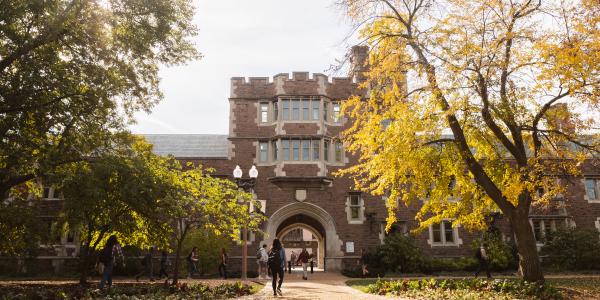This semester, Arts & Sciences welcomes more than 30 new faculty members! Meet some of the new members of our community.
This fall, departments and programs in the social sciences welcomed new researchers and instructors to their ranks. See brief introductions below, and be sure to also read about our new faculty in the humanities and new faculty in the natural sciences and mathematics.
Anthropology

Natalie Mueller, PhD, joins the Department of Anthropology as an assistant professor. Mueller is an archaeologist and paleoethnobotanist who specializes in the historical ecology of North America and the origins of agriculture. Her research also concerns the development and spread of social institutions related to food production and food security. Mueller returns to Washington University after earning her doctorate here in 2017. From 2017-19, she was a postdoctoral researcher at Cornell University. While at Cornell, her work was published by outlets including Nature: Plants, the Journal of Archaeological Method and Theory, and the Journal of Anthropological Archaeology.

Stephen McIsaac, PhD, joins the Department of Anthropology as a lecturer in sociocultural anthropology. McIsaac is a sociocultural and medical anthropologist who has conducted long-term ethnographic fieldwork on mental health and psychiatry in South Africa. Earlier this year, he earned his doctorate in medical anthropology with a designated emphasis in critical theory at the University of California, Berkeley. Grounded in critical studies of medicine and science, postcolonial theory, and theories of violence and subjectivity, his work explores emerging therapeutic experiments in South Africa that attempt to care for the psychic and structural afterlives of apartheid.
Environmental Studies

David Webb joins Environmental Studies as a lecturer. Webb teaches courses on sustainability in business, ecological economics, and community engagement for sustainable development. From 2015-19, he directed the Emerson Leadership Institute at St. Louis University (SLU). Also at SLU, he earned a master’s degree in sustainability, served as executive co-chair of the St. Louis Climate Summit, and had leadership roles within the university’s Center for Sustainability. Since spring 2018, Webb has taught individual courses with Environmental Studies; he now works with the program on a full-time basis. He is certified through the International Society of Sustainability Professionals.
Political Science

Taylor Carlson, PhD, joins the Department of Political Science as an assistant professor. Carlson studies political communication, political psychology, and race/ethnicity in American politics. With coauthors Marisa Abrajano and Lisa García Bedolla, Carlson’s book Talking Politics: Political Discussion Networks and the New American Electorate is under contract with Oxford University Press. Her work has also been published in the Journal of Politics and American Political Science Review, among other journals. Carlson is also working on a book funded by the National Science Foundation with Jaime Settle. She earned her doctorate from the University of California, San Diego, in 2019.
William Nomikos, PhD, joins the Department of Political Science as an assistant professor. Nomikos’s research focuses on international efforts to reduce post-conflict fragility in developing settings, particularly in West Africa, where he has conducted fieldwork. He manages a geocoded dataset on UN peacekeeping deployments to Africa covering 1999-2018. Nomikos earned his doctorate from Yale University in 2018 with a dissertation titled “Local Peace, International Builders: How the UN Builds Peace from the Bottom Up.” His work has been published in the Journal of Politics, International Security, and the Journal of Peace Research.
Carly Wayne, PhD, joins the Department of Political Science as an assistant professor. Wayne’s research lies at the intersection of security studies, modern warfare, terrorism, and the psychology of political violence. She is particularly interested in exploring the strategic and psychological dimensions of terrorism. Her work is published or forthcoming at a number of journals, including the Journal of Conflict Resolution and Journal of Peace Research. Her book, The Polythink Syndrome (with Alex Mintz), was awarded the 2016 Alexander George Book Award by the International Society of Political Psychology for best book in the field of political psychology. Wayne earned a doctorate from the University of Michigan in 2019.
Psychological & Brain Sciences
Wouter Kool, PhD, joins the Department of Psychological & Brain Sciences as an assistant professor. Using a broad range of tools and perspectives from experimental psychology, neuroscience, behavioral economics, and machine learning, Kool focuses his research on questions that lie at the intersection of decision making and cognitive control. Recently, his work has been published in Psychological Science, Nature Human Behaviour, and other outlets. Kool earned his doctorate from Princeton University in 2015 and went on to become a postdoctoral fellow at Harvard University. In 2017, he earned the best talk award for the Meeting of the Society for Neuroeconomics.
Sociology
Patrick Ishizuka, PhD, joins the sociology department as an assistant professor. Ishizuka specializes in demography and social inequality at the work-family intersection, including research on parenting norms, how money and work affect couples’ relationship outcomes, and employment discrimination against mothers. One recent article, “Social Class, Gender, and Contemporary Parenting Standards in the United States: Evidence from a National Survey Experiment,” was covered by The New York Times, The Atlantic, and other national outlets. Ishizuka most recently served as the Frank H.T. Rhodes Postdoctoral Fellow at Cornell University, a position he accepted after earning his doctorate at Princeton University in 2016.





